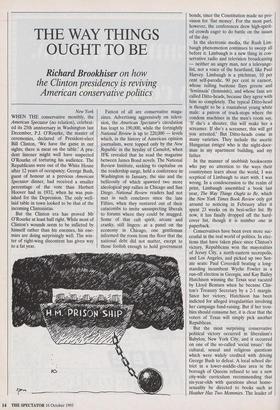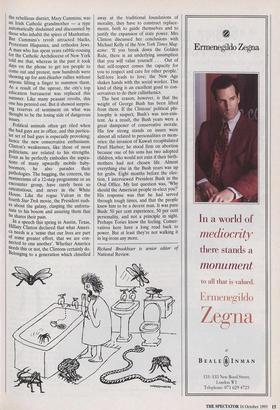THE WAY THINGS OUGHT TO BE
Richard Brookhiser on how
the Clinton presidency is reviving American conservative politics
New York WHEN THE conservative monthly, the American Spectator (no relation), celebrat- ed its 25th anniversary in Washington last December, P.J. O'Rourke, the master of ceremonies, declared of President-elect Bill Clinton, 'We have the game in our sights; there is meat on the table.' A pru- dent listener might well have suspected O'Rourke of torturing his audience. The Republicans were out of the White House after 12 years of occupancy; George Bush, guest of honour at a previous American Spectator dinner, had received a smaller percentage of the vote than Herbert Hoover had in 1932, when he was pun- ished for the Depression. The only well- laid table in town looked to be that of the incoming Clintonistas.
But the Clinton era has proved Mr O'Rourke at least half right. While most of Clinton's wounds seem to be inflicted by himself rather than his enemies, his ene- mies are doing surprisingly well. The win- ter of right-wing discontent has given way to a fat year. Fattest of all are conservative maga- zines. Advertising aggressively on televi- sion, the American Spectator's circulation has leapt to 190,000, while the fortnightly National Review is up to 220,000 — levels which, in the history of American opinion journalism, were topped only by the New Republic in the heyday of Camelot, when JFK revealed that he read the magazine between James Bond novels. The National Review Institute, seeking to capitalise on the readership surge, held a conference in• Washington in January, the size and the bellicosity of which spawned two more ideological pep rallies in Chicago and San Diego. National Review readers had not met in such conclaves since the late Fifties, when they ventured out of their catacombs to invite unsuspecting liberals to forums where they could be mugged. Some of that cult spirit, arcane and cranky, still lingers: at a panel on the economy in Chicago, one gentleman informed the room from the floor that the national debt did not matter, except to those foolish enough to hold government bonds, since the Constitution made no pro- vision for 'fiat money'. For the most part, however, the conferences drew high-spirit- ed crowds eager to do battle on the issues of the day.
In the electronic media, the Rush Lim- baugh phenomenon continues to sweep all before it. Limbaugh is a new thing in con- servative radio and television broadcasting — neither an angry man, nor a televange- list, nor a voice of the heartland, like Paul Harvey. Limbaugh is a pitchman, 10 per cent self-parodic, 90 per cent in earnest, whose rolling baritone flays greens and leminazis' (feminists), and whose fans are called Ditto-heads, because they agree with him so completely. The typical Ditto-head is thought to be a roustabout young white male: a patron of truck-stops where the condom machines in the men's room say, `If she's a shouter, this will make her a screamer. If she's a screamer, this will get you arrested.' But Ditto-heads come in many varieties. They include the ascetic Hungarian émigré who is the night-door- man in my apartment building, and my father.
In the manner of snobbish bookworms who pay no attention to the ways their countrymen learn about the world, I was sceptical of Limbaugh to start with. I was wrong. In a condescension to the realm of print, Limbaugh assembled a book last year, The Way Things Ought to Be, which the New York Times Book Review only got around to noticing in February after it spent 23 weeks on its best-seller list. By now, it has finally dropped off the hard- cover list, though it is number one in paperback.
Conservatives have been even more suc- cessful in the real world of politics. In elec- tions that have taken place since Clinton's victory, Republicans won the mayoralties of Jersey City, a north-eastern necropolis, and Los Angeles, and picked up two Sen- ate seats: Paul Coverdell beating a long- standing incumbent Wyche Fowler in a run-off election in Georgia, and Kay Bailey Hutchison winning the Texas seat vacated by Lloyd Bentsen when he became Clin- ton's Treasury Secretary by a 2-1 margin. Since her victory, Hutchison has been indicted for alleged irregularities involving her campaign fund-raising. But if her trou- bles should consume her, it is clear that the voters of Texas will simply pick another Republican.
But the most surprising conservative political victory occurred in liberalism's Babylon, New York City, and it occurred on one of the so-called 'social issues': the cultural, sexual and religious questions which were widely credited with driving George Bush to defeat. A local school dis- trict in a lower-middle-class area in the borough of Queens refused to use a new city-wide curriculum recommending that six-year-olds with questions about homo- sexuality be directed to books such as Heather Has Two Mammies. The leader of the rebellious district, Mary Cummins, was an Irish Catholic grandmother — a type automatically disdained and discounted by those who inhabit the spires of Manhattan. But Cummins's revolt attracted blacks, Protestant Hispanics, and orthodox Jews. A man who has spent years rabble-rousing for the Catholic Archdiocese of New York told me that, whereas in the past it took days on the phone to get ten people to come out and protest, now hundreds were showing up for anti-Heather rallies without anyone lifting a finger to summon them. As a result of the uproar, the city's top education bureaucrat was replaced this summer. Like many peasant revolts, this one has petered out. But it showed surpris- ing reserves of sentiment on what was thought to be the losing side of dangerous issues.
Political animals often get riled when the bad guys are in office, and this particu- lar set of bad guys is especially provoking; hence the new conservative enthusiasm. Clinton's weaknesses, like those of most politicians, are related to his strengths. Even as he perfectly embodies the aspira- tions of many upwardly mobile baby- boomers, he also parades their Pathologies. The hugging, the concern, the mannerisms of a 12-step programme or an encounter group, have rarely been so ostentatious, and never in the White House. Like the rogue Vulcan in the fourth Star Trek movie, the President rush- es about the galaxy, clasping the unfortu- nate to his bosom and assuring them that he shares their pain. In a speech this spring in Austin, Texas, Hillary Clinton declared that what Ameri- ca needs is a 'sense that our lives are part of some greater effort, that we are con- nected to one another', Whether America needs this or not the Clintons certainly do. Belonging to a generation which chiselled away at the traditional foundations of morality, they have to construct replace- ments, both to guide themselves and to justify the expansion of state power. Mrs Clinton discussed her conclusions with Michael Kelly of the New York Times Mag- azine: 'If you break down the Golden Rule, there is an underlying assumption that you will value yourself . . . Out of that self-respect comes the capacity for you to respect and care for other people.' Self-love leads to love; the New Age shakes hands with the social worker. This kind of thing is an excellent goad to con- servatives to do their callisthenics.
The best reason, however, is that the weight of George Bush has been lifted from them. If the Clintons' political phi- losophy is suspect, Bush's was non-exis- tent. As a result, the Bush years were a great dampener of conservative morale. His few strong stands on issues were almost all related to personalities or mem- ories: the invasion of Kuwait recapitulated Pearl Harbor; he stood firm on abortion because one of his sons•has two adopted children, who would not exist if their birth- mothers had not chosen life. Almost everything else in the Bush years was up for grabs. Eight months before the elec- tion, I interviewed President Bush in the Oval Office. My last question was, 'Why should the American people re-elect you?' His response was that he had served through tough times, and that the people knew him to be a decent man. It was pure Bush: 50 per cent experience, 50 per cent personality, and not a principle in sight. Perhaps Tories know the feeling. Conser- vatives here have a long road back to power. But at least they're not walking it in leg-irons any more.
Richard Brookhiser is senior editor of National Review.



























































 Previous page
Previous page